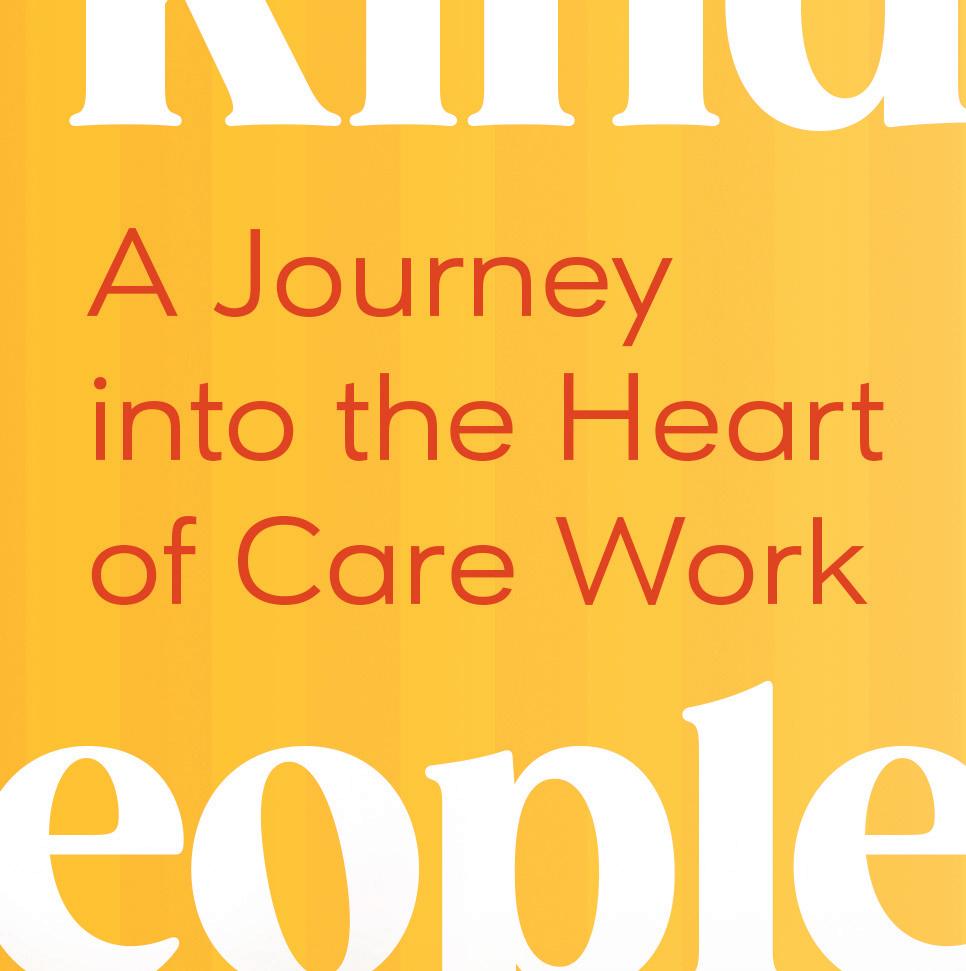PENGUIN BOOKS
UK | USA | Canada | Ireland | Australia India | New Zealand | South Africa
Penguin Books is part of the Penguin Random House group of companies whose addresses can be found at global.penguinrandomhouse.com.
Penguin Random House UK , One Embassy Gardens, 8 Viaduct Gardens, London SW11 7BW penguin.co.uk
First published by Fig Tree in 2024
Published in paperback by Penguin Books in 2025 001
Copyright © Kathryn Faulke, 2024
The moral right of the author has been asserted Penguin Random House values and supports copyright. Copyright fuels creativity, encourages diverse voices, promotes freedom of expression and supports a vibrant culture. Thank you for purchasing an authorized edition of this book and for respecting intellectual property laws by not reproducing, scanning or distributing any part of it by any means without permission. You are supporting authors and enabling Penguin Random House to continue to publish books for everyone. No part of this book may be used or reproduced in any manner for the purpose of training artificial intelligence technologies or systems. In accordance with Article 4(3) of the DSM Directive 2019/790, Penguin Random House expressly reserves this work from the text and data mining exception
Typeset by Jouve (UK), Milton Keynes
Printed and bound in Great Britain by Clays Ltd, Elcograf S.p.A.
The authorized representative in the EEA is Penguin Random House Ireland, Morrison Chambers, 32 Nassau Street, Dublin D02 YH68
A CIP catalogue record for this book is available from the British Library
ISBN : 978–0–24167–249–5
Penguin Random House is committed to a sustainable future for our business, our readers and our planet. This book is made from Forest Stewardship Council® certified paper.
This book is dedicated to care workers everywhere. And all those we care for.
Foreword
Mrs Singh is frail and elderly and lives in an imposing Victorian property with an overgrown garden and an unfeasibly large front door. I have never met Mrs Singh before, but I have been given a key to that door and instructions to help her to bed. Inside, it is quiet. The last of the day’s light filters through brittle net curtains strung against huge sash windows. The house is so big that it takes me some time to locate Mrs Singh in the basement. The house is also grand, even at this lower level.
Mrs Singh’s room has a worn but once expensive rug that almost entirely covers the acres of dark wooden floorboards. She sits in an enormous armchair, the walls around her going up at least twelve feet, the bed far, far away on the opposite side of the room. Mrs Singh speaks little English. When I put my head to one side, eyes closed on my praying hands, she giggles. I raise my eyebrows. Mrs Singh giggles. I mime drinking a cup of tea and she giggles and giggles. I empty her catheter bag and fetch her nightdress. She giggles. ‘You come again,’ she implores, giggling helplessly. ‘You come back, yes?’ And we continue getting on like a giggling house on fire until I try to help Mrs Singh to her giggling feet and discover that she cannot walk.
Flummoxed, I cannot immediately think what to do. I only know what I cannot do. I cannot do nothing because I am Mrs Singh’s care worker for the evening and the last person she will see today. I look at that far, far-away bed and sigh. I look at Mrs Singh. Mrs Singh giggles. I consider how
little she will be giggling if she’s left to sit in her chair all night, and have a silent but firm word with myself. Then, I take a deep breath and straighten up. Of course I can get her safely into that bed. Whatever it is that getting her into it turns out to entail.
I once thought that I’d become a care worker by chance, but now I wonder if it was simply inevitable. I come from a rather humble, country background with parents who were kind and practical. My father, an expert mechanic, was always mending other people’s cars and appliances as well as our own, and my mother found clever solutions to problems of mending and sewing and making do. They looked after me and my sister and our pets and other people and plants and baby birds that fell from nests and hungry hedgehogs and vegetable plots. They took care of everything.
I grew into a rebellious teenager. Hitch-hiking into the nearest town and staying out all hours, going barefoot in winter and booted in summer, taking my skirts up short and ironing my hair down long and playing jagged, distorted music with savage lyrics far too loudly from behind my tightly closed bedroom door. I didn’t appreciate the beauty of the countryside or the values of my parents. I am ashamed to say that I was just bored. I couldn’t wait to leave. In those days, school was only compulsory until the age of sixteen. My school, convinced that I was no academic, wasn’t about to try to persuade me to stay on but I didn’t mind at all. I think my mother was heartbroken when I caught the train to London. I’d thought I was only carrying a suitcase. It wasn’t until much later that I discovered I was carrying my parents’ kindness, compassion and practicality inside me too. I had absorbed the tenets of care. I just didn’t know it back then.
London was a playground in those days. Albeit a dangerous one. I spent the first few nights sleeping on the floor of
the house of a man I thought had befriended me until he finally accepted I wouldn’t be going into his bed any time soon. He kicked me out, suitcase and all, in the middle of a winter night and I slept outside a Tube station, warm air coming up from the underground through the gaps in the closed metal grilles. I slept there several more nights, learning a bit about fear and loneliness, until I talked myself into a live-in pub job.
From then on, work provided money for fun and for travel – not so much to other countries but to places in them that I had seen in pictures or on the telly. I went to the Pyramids I’d seen on an archaeology programme I’d watched with my dad. I went to the Eiffel Tower I’d seen in a presentation in my school French lesson. I went to the Dead Sea that I’d seen my grandad floating on in a photo he’d sent home to my grandma from his army service. What I did for work didn’t seem important until long after I’d met my husband and we’d had children. Surrounded by other young parents who were largely professionals, I suddenly needed to be something. Struck by the desire to get properly educated, earn a proper wage and become a proper person, I decided to attempt university. I wasn’t sure I could do it. I wasn’t sure we could afford it. But once I began, I loved it. Now I understood biochemistry and anatomy, knew the periodic table inside out, learned how a heart beats. I could even, miraculously, do mathematical equations. The day I learned how muscles move I explained it in molecular detail to anyone who would listen. Then, at last, I got my proper job. In a hospital as a clinical dietitian. And I did it so well that no one, not my husband, not my friends, not even my colleagues, knew how difficult I found it. Well, almost no one. No one except for Greg.
Greg busked outside the local greengrocer’s. He was always there. Every year, week after week. He’d seen my
children grow up as we passed him on the street playing his guitar. He was shabby, dirty even. His fingernails were black with grime, face lined, thin chin speckled with stubble, but he had a skinny swagger and I liked the way he dressed. Always in shades, coloured scarf, leather jacket. Despite the jacket you could see the sharpness of his shoulders, and despite the swagger he had no attitude. He was all smiles and friendliness, helping grannies with their bags, chatting to the little kids, strumming and singing in the high street, whatever the weather. I would often stop to talk to him. I was overwhelmed with the responsibility I felt for my patients, the fear of appraisals, the officialdom, the form filling, the outcome measuring. I couldn’t tell my family or my friends about this. But I could tell Greg. Greg was the only person I knew who was worse than me at having a proper job. He couldn’t do appraisals or officialdom either. He was an absolute expert at avoiding form filling and he’d ensured that the only outcome measurement he was about to do was to count the coins people threw into his guitar case at the end of the day. Greg understood me perfectly.
In the end, I quit the job.
It didn’t make things better. It made them worse. Now, I felt guilty as well as anxious. My lack of employment became the elephant in the room and my husband’s patience – understandably – was running out. Children still at home but grown up, not needing me, I became depressed, no longer caring about much at all until, one day, I learned that Greg was ill. He was frightened and I remembered how that felt. Indeed, I knew how that felt now. So I began to pour all my energy, all my attention, into keeping him safe and getting him well. Although this was futile, I got something else out of it too. I got a place to escape to, physically and psychologically. I hid myself in caring for Greg and I discovered
I was pretty good at caring so I decided the best plan of action would be to get a job as a care worker. And that’s how I’ve ended up here, with Mrs Singh.
I point to Mrs Singh’s legs, then to the bed and say, ‘How?’ She giggles. I ask again and she giggles again but is quite able to tell me how. Just, of course, not in English. I shake my head. She giggles. I pretend to frown at her. She giggles again and points up. I look up at the enormous ceiling rose. Mrs Singh giggles. Then I notice it. A track runs over the ceiling from our side of the room to the bed a million miles away where a bar dangles from it. There really is, I realize with a sinking heart, such a thing as a ceiling hoist. I frown for real. Mrs Singh giggles. I feel cross. She giggles. I look at her sternly. Mrs Singh stops giggling.
I call the office. Berate them. Insist that, no, I have never been to Mrs Singh before, and no, I have never been taught how to use a ceiling hoist. Listen to their instructions. Tut when they tell me Mrs Singh knows how it all works. Feel quietly terrified at having to figure it out on my own but think we should be able to safely crack it if we take things slowly. So long as we refrain from all the giggling. Mrs Singh is silent as I press the remote control several times to watch the bar of the hoist swing back and forth across the chasm between her chair and the bed. She looks at me, sombre, as I examine the sling. She peers, grave, as I slide it between her back and the chair and gazes, solemn, as I pull two ends out underneath her armpits. Sits stony faced as I take the other two ends and pull them up between her legs. Remains unsmiling as I press the control pad and make the bar go up and down a couple of times before lowering it to the level of her sling. Nods seriously as I attach four loops on the sling to the four hooks on the bar.
I press the button that raises the sling with one hand and
guide it with the other. My precious cargo rises, hushed, into the air, knees at the height of my chin. I hold my breath. The track overhead looks about as robust as the ones fitted to my shower curtains. I push the button that advances the sling toward the bed and am so focused on keeping it well clear of the wall as it glides up and along that I don’t notice the sound until we are halfway over.
‘Honestly, Mrs Singh,’ I say, ‘you really are the giggliest person I’ve met in my entire life.’
Mrs Singh safely tucked in, I go on to my next calls. Calls to other new customers and to my regulars. Calls that are unlikely to contain as much giggling but might be just as fun. Calls that are easy and calls that are difficult in a myriad of different ways. Calls that run smoothly or contain as much emotion as a Hollywood blockbuster. Because care is like that. I have learned that care work is fascinating. Also boring. And exhausting. That it contains both despair and euphoria. And large quantities of meaning. The one thing it doesn’t contain is, of course, money. But it is chock full of everything else and replete with characters. Care work is so full of stories that I could not help but begin to write them down until they became this book.
Come with me on my journey into the world of care work. Meet my customers. Let me introduce you to my gentle friend Veronica Rose, to the outrageous Mr Radbert, to sociable Patrick, to sweet and funny Ina, to wise and tender William and to the feisty fiend that is Beryl. Meet Greg, his friends and his philosophy. Come with me and see the extraordinary drama to be found in ordinary lives. Come with me and feel how it is to be in this place that is valued so little but is so vital. I believe that caring is the most important thing one can do and that everyone should know about it. And, of course, one day so many of us will need it.
The only option
Maggs had been surprised to see me. ‘You’re not our typical applicant, you know? I mean, you’ve got a degree.’
‘I’m sure I can do it though,’ I said, looking at the carpet tiles. They were charcoal grey.
‘Oh, I don’t doubt that,’ said Maggs, ‘but, really, why would you want to?’
We were sitting opposite one another, a pale grey formica tabletop between us. The legs of the table were steel grey, the walls were pewter grey and by the window an iron-grey heater threw little warmth into the chilly side room. Everything was grey except for Maggs. Her green cardigan was unbuttoned over a yellow dress, and she wore raspberrypink lip gloss to match her shoes.
Having left my job as a hospital dietitian, I was looking for work. The last time I’d looked for casual employment had been so long ago that the employer had tested my typing skills on an actual typewriter. Later, I’d got jobs through word of mouth. But now that I was middle-aged, word of mouth no longer existed and job hunting largely took place online. I’d found two different types of employment websites. One was for hotshots and listed positions under categories such as Arts and Heritage, Legal, or Finance and Accounting. The roles on offer included Lecturers, Managers and Department Heads, and the pay was given as yearly salaries in thousands. The other type of website was for
non-hotshots and, apart from a smattering of oddball opportunities, listed jobs in hospitality and care. The roles on offer included catering staff, support workers and security guards, and the pay was given as hourly rates in pounds.
The complexity of applying even for the non-hotshot jobs had shocked me. I remembered being able to just walk into those. I’d once got hired on day one, been fondled in the lift on day two and found a new job by close of play on day three. It was all so simple back then. Apart from the gettingfondled-in-the-lift side of things, of course. But now there was no more pub work unless you were bar trained and no more waitressing unless you were server trained. In fact, there was pretty much no more anything without studying a candidate pack, completing a questionnaire with essays and giving a fascinating reason for wanting the job. Earning money just to get by was no longer acceptable. Everything had become a career.
Then I’d seen the advertisement that Maggs had placed. It said that in exchange for honesty, patience, compassion and reliability, she would forgo experience and really long application forms, give training, and pay nine pounds fifty an hour. Nine pounds fifty didn’t sound much but, since I’d have to commit to covering at least two evenings and every other weekend on top of working most weekdays, I doubted I’d have the time or the energy to spend any money.
The company was based in a shared office building on an industrial estate in South London close to where I lived, and the brief introductory form I submitted had barely been with them five minutes before I was summoned up the narrow stairs, past a tiny kitchenette, through a corridor lined with boxes of blue latex gloves and into the main office where three desk-bound workers tapped at computers and fielded phone calls. A mannequin with fuzzy brown hair
wearing a lilac tunic and black trousers stared blankly from one corner and there was a medical bed and a standing hoist in another.
‘So why do you want to be a carer?’ Maggs asked again. ‘Come on, Kate, it’s not a rhetorical question. It’s part of the interview.’
I’d have been better able to answer that question before Maggs had reminded me I was in a job interview. Being so anxious that I was no longer capable of job interviews, I definitely couldn’t answer it any more. Maggs tried again. ‘Perhaps it’s because you like working with people? Or that you’d like to help them remain safe and independent in their own homes? Kate?’
‘Yes,’ I said. ‘Put that.’
‘Which?’ Maggs asked.
‘Either,’ I said.
Of course, you can’t possibly tell Maggs the real reason you want to be a carer.
For months now you’ve been making days out of cleaning an already spotless house, doing the laundry, cooking up gastronomic delights night after night and putting the bins out on time. But all that is superfluous to helping pay the bills. You’ve run out of excuses not to get a new job and you hate the idea of it. But not as much as you hate yourself for having failed at your previous job. Your own version of a hotshot job.
You tell yourself you failed at that job because it required more attention than you, being responsible for homework, for parents’ evenings and sports days and bake sales, for taxi services to judo and tennis lessons and parties, for revision and cramming and timetabling of exams, for nightlong nursing of broken bones or broken hearts, could possibly give it. It was difficult doing all that as well. But to say that is why you failed is not true. The truth is
you failed because you were scared. Scared you would make a catastrophic mistake. Scared someone would come along and ask why on earth you’d been given a job meant for a cleverer, worthier person. Scared you weren’t good enough, and tired of worrying about it.
So eventually you’d quit, but you’re still scared now. Scared that, after all these months out of work, you will no longer be able to get any other job at all. Except, perhaps, for the one that Maggs is offering. The one you’ve been fumbling your way toward as you try and help Greg, who has been growing sicker and who lives, precariously, alone. You suspect that being a carer is so awful a prospect that anyone who passes the security check will get hired. But even that is not the real reason you’re applying for it. The real reason is because somewhere deep down in your sorry-for-itself, middle-aged brain you think it will be punishment for failing to make a success of that last job, the job that you were once given precious resources and time – utterly unrecoverable, lost time – to study for.
In a world where staff were in such short supply, the success of my application for care work was inevitable. ‘Morning all,’ said Rita a fortnight after my interview. ‘I hope you slept well because we’re going to be covering a lot of ground this week, yaaah?’ Like Maggs, she was dressed in vibrant colours, her hair a rigid blonde helmet around her fully made-up face. She had heels on, and pulled biros and biscuits from her faux-leather aqua-blue handbag. It seemed that, in the world of caring, if there was an opportunity to dress colourfully one took it, yaaah? I wondered if this was because the job was so drab that when you weren’t doing it you were compelled to compensate for the gloom you’d had to withstand when you were.
The trainee carers were all women, of various ethnicities,
aged from just nineteen to fifty-three. There were supposed to be eight of us, but four hadn’t shown up. I was silently alarmed by this attrition rate, but everyone else cheerfully ignored the empty chairs and shuffled up together to watch Rita’s lengthy presentation and fill out our workbooks. If we didn’t know the answer to one of the questions in the workbook, Rita happily supplied it, and if we were taking too long she would rapidly dictate half a dozen answers to save us spending too much time on thinking. When one of the absent trainees arrived two hours late, Rita, unperturbed, spent half an hour bringing her up to date with dictation while the rest of us ate the biscuits in the kitchenette.
‘Any questions?’ Rita said, toward the end of our third and final day.
‘How do we get into people’s houses?’
‘Customers, we call them customers. Mostly your customer will let you in.’
‘What if I’ve got a customer who can’t walk?’
‘They’ll have keys outside. In a key safe. With a code. Now I need to teach you how to hoist, yaaah?’ Rita said and we returned to the main office. The three admin staff were shouting back and forth about how to cover Radbert because Fatima’s daughter was ill and who could go and do a review on William now he was out of hospital and was it possible for Itzie to switch to Beryl if Sheila could go to Franklyn because Danny was off and there was no way the number sixty-three would get Sheila to Mrs Gibson on time otherwise? Only the mannequin paid us any attention as we loaded one another into a sling and used the freestanding hoist to transfer ourselves lumpily from floor to bed and back again. The mannequin did not look impressed.
‘Any other questions?’
‘We need to have a phone?’
‘Oh yaaah. We have an app for phones that gives you your rota and the customer details. You’ll write your notes onto it. For each visit.’
‘Do you give us a phone, then?’
‘No,’ said Rita, ‘but we give you a contribution toward your phone, yaaah?’
‘How much?’
‘Three pounds a month. And for travel we pay twentyfive pence a mile.’
Before I or any of the other applicants could express our dismay, Rita had moved on. ‘Now, uniforms, they cost twelve pounds each and I suggest you buy a spare. So you can wash them regularly, yaaah? You should probably buy a fleece as well. For when it’s cold. Those are fifteen pounds. And you’ll need to pay for the security check.’ We swapped outraged eye contact at realizing we might be working several hours before we were even in profit, but none of us walked out. I guess that showed me I wasn’t alone in seeing this as my only option.
And that was it. I was working. One doesn’t really learn how to do care work from a lengthy presentation, nor from any of the other desk-bound training sessions that will occasionally crop up. One learns about care work by shadowing and assisting other care workers out in the real world, and I learned it from some of the calm and patient best. I learned from Itzie that a carer should always keep their customer at the centre of everything they do. I learned from Julie that a carer should advocate so that the voices of those who are most vulnerable are heard. I learned from Chrissy that a carer should provide companionship where it is needed even if time constraints make this challenging. I learned absolutely everything from these carers who do their job so well. Of course, there are bad carers. I’ve met only a few. But
why wouldn’t there be when the price paid at the coalface of care work is so low? Caring is considered low-skilled work, but my co-workers were largely hard-working, dedicated experts, out in all weathers, at times when the majority of the population were still asleep, eating lunch or watching the evening’s television. Many would spend their own time sitting with those who were lonely, accompanying people on hospital visits, or solving unscheduled problems from blocked sinks to overgrown lawns. They moved people with many different disabilities and frailties using specialized equipment, could spot weight loss, pressure sores and dehydration before they’d barely become established and, most crucially, understood the importance of dignity, autonomy, a cup of tea and a bloody good natter.
Caring is the toughest thing I’ve ever done but also by far the most rewarding. Early on, when I asked one of my colleagues why she did the job, she said simply, ‘It’s a passion,’ and she was right. But a magical thing happened too. There were times when my customers helped me through exhaustion, grief and heartbreak. They provided me with comfort and advice. They gave me love.
There were times, many times, that the caring went both ways.
2.
Three weeks
Up by six, you put on clothes you laid out the night before. A pair of cheap black trousers you bought just a couple of days ago, an old work shirt, trainers. Your uniform tunic is pale lilac with white piping. The fabric, not yet washed, is stiff. Maggs said to buy a size fourteen to give you extra room for a jumper underneath, but this size fourteen is enormous. It drowns you and now you’re wondering whether Maggs had just ordered too few smaller sizes and saw you coming.
You shove a couple of aprons, torn from the enormous roll of white plastic you were given, into a grubby, khaki backpack, along with two pairs of plastic shoe covers and a box of medium-sized plastic gloves. Then you force down a piece of toast, suddenly nauseous at what you have done. You’ve called your own bluff in a game of dare gone horribly wrong. Thrown several babies out with the bathwater. Burned down an entire street of houses. Taken a pneumatic fucking drill to a perfectly ordinary nut and thoroughly wrecked your curriculum vitae. You’ll never get another decent job again after this.
The teenager floats in, bleary-eyed. ‘Hey, that’s my backpack.’
‘My God, you’re up early. All right if I borrow it?’
‘Dough shift.’ He clicks on the kettle. ‘Got to be at the bakery by seven. Keep the bag, it’s on its last legs.’ Then he frowns, ‘Are you OK ?’
‘Not really,’ you say. ‘I mean, look at me,’ and you stand up, hold out your arms and spin sarcastically around in the too-big
polyester tunic as though you’re modelling Moschino. ‘I never,’ you say, ‘ever, thought life was going to turn out this way.’
‘Oh, Mum,’ he says, ‘it’s not so bad. You love people. You might enjoy this. If only you’ll let yourself.’
And so it was that one morning in the middle of winter, I found myself waiting outside Franklyn’s house. I was going to wash him. I’d never washed a stranger before and I was nervous. I was going to wash Franklyn with Itzie. Apart from my fellow trainees, I’d never really met another carer before either, but I’d seen stories about them in the news. They always seemed to be hitting people or stealing things, so I was quite nervous about meeting Itzie too. But I was mostly nervous about the washing.
I’d been up half the night trying to comfort my friend Greg. When he first became sick, I’d made him go for chemotherapy. He’d tolerated just one session. Not because of the side effects but because, having spent so much of his life happily on his feet playing music outside, he could not bear to spend so long in miserable silence on his back inside. Greg has now chosen to pay as little regard as possible to his wretched predicament. He dislikes the attention of strangers, including those from the medical professions. Instead, I go to him. Almost every day now. To dish out the few medications he is willing to take, to clean, to cook tiny portions of tempting meals for him to pick at, to keep him company and to provide a whipping post for his fears and frustrations. Last night, we had stayed up too late and talked too much, using infantile codewords, about the tasks I might soon have to undertake that would fill him with shame and me with disgust. We had wept. Then he’d had yet another cigarette and we’d both had several large glasses of Scotch before I’d gone home to bed just four hours ago.
Now, as I stood stamping my frozen feet against the cold, I heard singing. Then I saw her. Itzie didn’t so much walk as sashay down the street, well wrapped up in a long coat, scarf and bobble hat. Despite her garb and large girth, Itzie was graceful. She had a voice like honey and her teeth were sugar-white in a generous smile. Regardless of that smile, I was nervous about the number of questions I’d be able to ask before Itzie’s patience ran out.
‘You’re Kate,’ she said, ringing the doorbell.
‘I am,’ I said. ‘I don’t really know what to do.’
‘You’ll be fine,’ Itzie said, but I didn’t know how she could possibly tell that, since I didn’t yet know myself whether I’d be fine.
A middle-aged woman opened the door. ‘Good morning, Lucille,’ said Itzie, taking off her bobble hat. Under the hat her hair was knotted neatly on top of her head like a crown. ‘How’s Dad today?’
‘Morning, lady, much the same,’ said the woman. She turned and followed the sound of breakfast television down the warm hall, while Itzie and I put on plastic aprons, shoe covers and gloves. Itzie looked like an empress being made to do the cleaning. ‘You go fill this with soapy water,’ she said, handing me a plastic bowl.
It’s surprisingly difficult to find the bathroom in a stranger’s house, especially if you don’t want to use up one of your annoying questions by asking where it is. I tiptoed through two doors before I was able to fill the bowl, squirt in soap, throw in a couple of blue flannels and return to Itzie. She was in a room containing a man asleep in a medical bed, an armchair on wheels, a metal hoist and a chest of drawers from which she was pulling clothes, towels, bedlinen, tissues and an adult incontinence pad. I’d seen an adult incontinence pad once before. It had been lying on the floor
of a swimming-pool changing room years ago. I’d complained and asked one of the lifeguards to clear it up. I don’t remember that it was even dirty, but I’d been disgusted anyway.
‘Oh, not two blue ones,’ Itzie said, looking in the bowl. ‘One blue and one brown, please.’ I swapped one of the blue flannels for a brown one.
Itzie motioned me round to the other side of the bed and swept down the bed rail on her side. I pressed the catch on my side, jiggled the rail, caught my apron in the mechanism, swore and blushed. ‘How?’ I said, as the rail slammed down so hard it sounded like a car crash. The sleeping man’s arms flew up into the air, but he didn’t open his eyes. ‘God. Sorry,’ I said, ‘the training didn’t cover how to lower bed rails.’
‘Mr Franklyn, sleepyhead,’ sang Itzie, grinning. She pushed the button on the bed control that raised the mattress to the level of our hips. ‘We going to wash you, Mr Franklyn,’ she continued, as she lifted the blanket and pillows away.
Franklyn was wearing a pink T-shirt with a green palm tree on it. I tried to take his right arm out of it, but his right arm didn’t move. ‘Sorry,’ I said, ‘how?’
Itzie took Franklyn’s mobile left arm out first, so that the T-shirt slipped easily over his head and down his frozen side leaving him naked except for the wretched pad. I had never seen a man so thin. His skin, burnished brown, was stretched over prominent cheekbones and all the way down his long limbs, hip bones jutting up like sails. You could have slotted toast between his ribs, and the lumps where they attached themselves to the sternum looked like two rows of tiny brown pebbles. He reminded me of a television programme I’d once seen about prehistoric burials.
‘And the sheet?’ I said. Itzie replied by tugging it out from
under the mattress and pushing as much of it under Franklyn as she could. Then she rolled him toward her and I pulled the sheet out from under him. The bed was stripped. I smelled frying. Lucille was in the kitchen.
Itzie used the blue flannel to wash Franklyn’s face. ‘Mr Franklyn,’ she sang, ‘is morning, wake up.’ She washed his face a second time and he opened his eyes. ‘Well, hello!’ sang Itzie. ‘Is me, Mr Franklyn.’ Franklyn smiled at her.
‘Hello, Franklyn,’ I said, ‘I’m Kate.’ Franklyn did not turn his head.
Itzie washed Franklyn’s left arm and passed me the flannel while she used the towel. The triangular hollows beneath Franklyn’s collarbones were deep enough to hold water and as I washed his right arm I could feel the exact shape of the humerus and the bones of his radius and ulna. I washed the pit of it, deep as a cup. Then I turned his hand to its paler side. The lines over it were like a child’s crossings-out in dark brown felt-tip pen. I washed everything twice, like Itzie did, swapping the flannel and the towel back and forth. In this way, she and I cleaned Franklyn from top to toe except the middle bit. Water and soapsuds had trickled onto the blue plastic mattress, so that Franklyn seemed like a swimmer floating motionless on his back in an ocean, eyes fixed on the sky. We dried the bed and moisturized him, and the fragrance of the cream mingled with the smell of Lucille making coffee and eggs.
Itzie did not put the blue flannel back into the bowl. There was just the brown flannel now. It was waiting for the Velcro fasteners to be undone. When Itzie pulled the front of the pad away, Franklyn’s nakedness shocked me. I watched her lift and wash and inspect, and wipe down the pelvis where the spindly legs joined on. Then she rinsed the flannel, squeezed it out and gave it to me.
‘I’m a bit nervous.’
‘You’ll be fine. Have you been to Beryl yet?’
‘No. This is my very first visit.’
‘Give it time. Soon you’ll find it’s nothing. Nothing at all.’
I wondered how much time I would have to give for this to become nothing. I remembered reading that it took twentyone days for people to change their self-image, to form new habits, to adapt. As I used the flannel, I imagined washing my husband and my father. I imagined washing Greg. I silently gave myself just three weeks, and not a day more, to get used to this before quitting. Then, after I had washed and dried the front of him from my side, Itzie bent Franklyn’s right leg up and rolled him toward me and I held him there with one hand on his bony spine and the other behind his knee and I saw the pad open underneath.
Lucille walked back through to the lounge to eat. I glimpsed her plate carried past the door, but I could no longer smell fried eggs and coffee. Or moisturizing cream. Three weeks, I thought again. If I can’t handle it in three weeks, I’ll give up.
Serene, beautiful Itzie folded the pad back onto itself to contain the mess and began to wipe. She wiped, discarded, wiped, discarded, wiped, discarded, and the tissue came away slightly cleaner every time but never clean enough and all I could think of was, three weeks.
Franklyn yelped. ‘Sorry, Mr Franklyn,’ said Itzie. But he could not see her.
‘Sorry, Franklyn,’ I said and he looked at me.
Eventually, the tissue came away white and then Itzie took up the brown flannel again and washed and put on barrier cream. She put the dirty pad into a plastic bag and laid out a fresh one, rolled Franklyn back onto it and eased him toward her. I reached under him for the other side of the pad and we rolled him onto his back again, pulled the clean, dry
softness of it up between his thin legs and fastened the Velcro on either side.
Franklyn needed dressing. We put on a fresh T-shirt, a red and navy striped one with a collar, and pulled jogging bottoms up to his knees. I bent his leg, pulled him toward me and hugged him there and said, ‘Nearly done, Franklyn,’ and Franklyn smiled at me as Itzie pulled the joggers up over the pad on her side. Then I rolled him back toward her and pulled them up on my side. We took up one sock each.
‘Stop!’ said Itzie.
There was a tiny red patch on Franklyn’s left heel. Itzie massaged and moisturized it. ‘You need a pillow against the footboard,’ she said. ‘You’re a lo-o-o-o-ong man, Mr Franklyn.’
The grey sling was difficult to fasten onto the hoist with Franklyn’s immobile body inside. I was alarmed at his dangling frame, but Itzie calmly raised him clear of the bed and told me to make sure he didn’t swing his brittle legs against the hoist’s hard, metal ones as we hefted it over to the big black armchair and poured him into it. ‘Morning, sir,’ she said, stroking his face.
I wheeled Franklyn through to the lounge and Lucille made porridge while Itzie showed me how to clean and remake the bed and write up notes. Then I fed this man I’d never met before, loading the spoon and touching it to his lip to remind him to open his mouth and waiting the slow minute for his swallow to finish and offering water and reloading. He looked at me, unblinking but smiling, indents the size of the cereal bowl in the sides of his dark temples and his eyes set far back in their sockets, but bright.
And at the end of an hour you leave, having earned a little under ten pounds to help clean and feed a complete stranger. It feels extraordinary. And satisfying. You’ve helped make someone’s day more
comfortable. Two people, actually, if you count Lucille. For a second you wonder if this job really is the penance you’d thought it would be. But only for a second.
Less than a fortnight later, Chrissy and I arrive at Beryl’s house to find the place covered in grapes, cigarette butts and glass. Having become frustrated during the night, Beryl has thrown her ashtray at the wall. I clean up the mess and encourage Beryl to take her medications.
‘Faaack off,’ she says when I offer her the medicine cup.
‘Beryl, please,’ says Chrissy.
Beryl smiles, tips the tablets into her mouth, closes her lips and then spits them out all over me.
I take a step backwards, but not because of the tablets.
‘Beryl,’ says Chrissy.
‘What?’
‘We need to change your pad.’
Beryl slams her hands down onto the sheet, tips her head back and screams at the ceiling. Visits to Beryl are always like this. Entertaining, but exhausting and slightly hazardous.
‘Beryl,’ I say, ‘it won’t take long.’
‘Faaack off.’
‘You born in London, Beryl?’ I try.
She raises one thin eyebrow. ‘I’m a Canning Taaan girl,’ she says cautiously.
‘You evacuated during the war?’
‘To Norwich.’
‘Wow,’ I say, ‘I was born near Norwich.’
Beryl raises her other eyebrow. ‘I,’ she whispers poisonously, ‘got nits in Norwich.’ Her face is all peevish grin.
‘They cut all my faaackin’ hair off in faaackin’ Norwich,’ she shrieks, hysterical with triumph.
I sweep the bed rail down and lift Beryl’s nightdress while
















